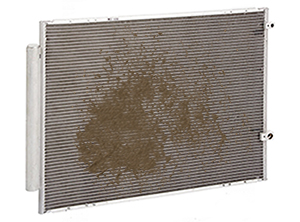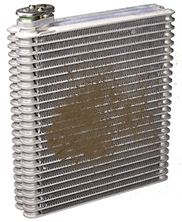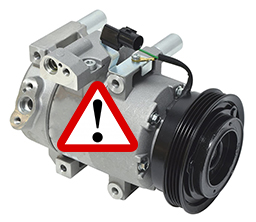The air conditioning is a blessing, especially in hot temperatures. Do you still sweat while driving your Toyota Tundra? Your air conditioning system no longer cools properly? This can have different causes. What these are and what you can do about it, we explain in this article.

The most common causes that hinders normal operation of air conditioning system on your Toyota Tundra are dirty cabin air filter, refrigerant leak, dirty or clogged condenser, dirty or clogged evaporator, bad blower motor, defective compressor, faulty blend door actuator or any fault in the electrical system.
1. Dirty cabin air filter
The pollen filter, also known as the cabin filter or microfilter, is a central component of the ventilation system in your Toyota Tundra. A dirty filter causes the overall ventilation of the interior to deteriorate resulting in reduced cooling, heating and air flow. It also puts unnecessary strain on the entire AC system which negatively impacts your Tundra’s fuel consumption.
There is no prescribed time for changing cabin air filter, but most manufacturers recommend a change after 10,000-20,000 miles. If you drive your vehicle in dusty or polluted environment, the filter can get dirty much sooner than manufacturer’s recommendation.
Start by inspecting the condition of the cabin air filter on your Tundra. Instead of changing it directly, it is often recommended to first clean the pollen filter. This can be done, for example, with a vacuum cleaner or a compressed air system, removing at least a large part of the visible dirt particles. Unfortunately, this procedure does not allow you to get into the deeper layers of the filter. Therefore, the filter performance will not increase significantly even after cleaning. As a rule, there is no avoiding a change.
Video: Replacing cabin air filter in Toyota Tundra
You don’t necessarily have to visit a workshop to clean or replace the pollen filter on your Tundra. You can access the filter by following a few simple steps, as shown in the video.
Note: Dirty cabin air filter mostly only leads to reduced cooling. If only hot air comes out of the air vents in your Tundra, then the problem probably lies somewhere else.
2. Dirty or clogged condenser
Like the radiator, the air conditioning condenser on Toyota Tundra sits at the front of the vehicle and is responsible for releasing the heat from the refrigerant into the ambient air. Over time, grime, bugs and other small particles can build up on its surface and in the gaps of its mesh. This hinders the condenser’s ability to release heat as less air passes through the mesh, which results in poor cooling in the interior.
If the condenser is dirty on your Tundra, the simplest solution is to clean it. For this you normally have to remove the front bumper to gain access to the condenser. You can use power washer for cleaning, but make sure that its at low pressure setting, as high pressure can easily damage the delicate fins on the condenser.

A clogged or leaking condenser can also be the reason for air-conditioning not working properly on your Tundra. A leaking condenser can lead to a loss of refrigerant and reduced cooling performance of the system. In order to find leaks in the air conditioning system, a leak search is carried out in the workshop using forming gas – even the smallest leaks can be detected. In this way, it can be determined whether the loss of refrigerant is due to a defective condenser. If this is the case, the only option is to replace the broken part.
3. Refrigerant Leak
Insufficient amount of refrigerant is still the main cause of a non-functioning AC system. Ideally, the refrigerant should never leak in a properly sealed AC system, but most car AC systems do leak small amount of refrigerant over time due to minor imperfections and may need recharging after every few years. If you don’t have the system serviced for a long time on your Tundra, the refrigerant level will eventually get so low that the system loses its cooling capacity. Just have it refilled and you can drive with pleasant temperatures again. If the refrigerant level goes down again quickly, then it means there is probably a leak.
In addition to the normal loss, component defects are usually responsible for the escape of the refrigerant gas on Toyota Tundra. A defective sealing ring, a worn line or a condenser that has been damaged by a stone chip are the most common causes.
Finding these mostly very small leaks is often not easy. The system is filled with forming gas (nitrogen with a little hydrogen) in the workshop. Larger leaks may already be heard or you can find them with a leak detection spray. Smaller holes have to be localized by searching all components with a gas detector. Once the leak has been found, this must be closed again by replacing the respective component.
4. Dirty evaporator
Dirty evaporator can also be the reason for AC problems on your Toyota Tundra. Cabin air filter captures most of the dirt or other airborne particles, but some escape and fall on to the evaporator. Over time, these dust particles can builds up on the fins and block the air flow through the evaporator, resulting in poor cooling.

The two most prominent symptoms of a clogged up evaporator on your Tundra are:
- The air flow from the vents is choppy and not smooth.
- The inside of the vehicle is developing a bad moldy smell.
Cleaning the evaporator on Tundra is not a simple task. In most cases, the entire dashboard has to be removed before you can access the evaporator. Therefore it is recommended to do this at a workshop.
There can also be a refrigerant leak in the evaporator, in that case the evaporator will have to be replaced.
5. Compressor failure
The compressor is the heart of the entire air conditioning system on Toyota Tundra. It consists of moving parts that convert what is actually a gaseous coolant into liquid – this is how your vehicle is cooled.

A broken compressor is usually irreparable. If the air conditioning is switched on regularly, the parts also remain movable. However, if you don’t turn on the air conditioning on your Tundra for a long time, the parts will stick. The result is a defective compressor that can no longer be repaired. The only thing that helps is swapping with a new one.
The worst damage, however, is a failure of the AC compressor when it “eats” itself due to insufficient lubrication or a production error, metal chips form, which are distributed throughout the Tundra’s AC system. If you only install a new compressor here, another failure is inevitable, as the chips immediately destroy the new component. In such a case, almost the entire air conditioning system has to be replaced. A maximum of the metal pipes can be rinsed here. Since the two heat exchangers (condenser and evaporator) are designed in cross-flow design, the detergent finds the path with the least resistance and leaves the chips behind. However, the high-pressure refrigerant pulls these chips back with it during operation and the next damage is inevitable.
6. Bad blower motor
If there is no air flow or reduced air flow from the vents on your Toyota Tundra, bad blower motor could be the culprit. A worn out or weakened blower motor can also produce abnormal sounds when in operation.

You cannot repair a broken blower motor, the part must be replaced with a new one.
Note: If the blower motor suddenly fails from one second to the next, you must first check whether a blown fuse is responsible for the failure.
7. Faulty blend door actuator
Blend door actuator plays a role in controlling the air flow and temperature inside your Tundra. Anytime there is a problem with the temperature of the air conditioning system, it could be a problem with the blend door actuator.
The most common symptom of faulty blend door actuator on Toyota Tundra is a slight clicking sound repeatedly coming from under the dashboard. The sound will be most prominent for a few seconds when you turn on the air conditioning or adjust the temperature. Sometimes changing the temperature can temporarily stop the sound.
A knocking noise could be another indicator of a bad blend door actuator on your Tundra, although its quite rare. The sound is something like a light tapping on the door and it happens when you turn on the air conditioning system or turn off the engine.
Conclusion
There are many reasons why air conditioning may not be working properly on your Toyota Tundra. When looking for the reason, you should always start with the most obvious cause, low refrigerant level in the system.
In any case, it is advisable for laypersons to visit a workshop. In the event of a defect, the mechanic can directly initiate the repair.





If you’re at idle and you turn on the AC and RPM’s jump up to 1000 for 3 seconds is that a sign that the clutch engaged on the compressor then turned off because of a low charge or bad sensor somewhere?
codes for 2013 toyota tundra
No power to my AC unit after fuses and relays have been replaced
I have the same problem not sure where the electrical problem is coming from? No power to AC lights or fan inside cab? Any thoughts